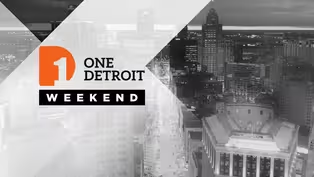
Environmental advocates fight climate impact on Detroiters
Clip: Season 7 Episode 48 | 7m 41sVideo has Closed Captions
A community-focused roundtable on the impact of climate change on Black Detroiters.
One Detroit contributor Stephen Henderson leads a community-focused roundtable with BridgeDetroit, the Michigan Environmental Justice Coalition, and Detroiters Working for Environmental Justice on climate’s impact on Black Detroiters. They talk about health issues arising from flooding, air pollution regulations, and the importance of residents speaking out on environmental issues to bring change.
Problems playing video? | Closed Captioning Feedback
Problems playing video? | Closed Captioning Feedback
One Detroit is a local public television program presented by Detroit PBS

Environmental advocates fight climate impact on Detroiters
Clip: Season 7 Episode 48 | 7m 41sVideo has Closed Captions
One Detroit contributor Stephen Henderson leads a community-focused roundtable with BridgeDetroit, the Michigan Environmental Justice Coalition, and Detroiters Working for Environmental Justice on climate’s impact on Black Detroiters. They talk about health issues arising from flooding, air pollution regulations, and the importance of residents speaking out on environmental issues to bring change.
Problems playing video? | Closed Captioning Feedback
How to Watch One Detroit
One Detroit is available to stream on pbs.org and the free PBS App, available on iPhone, Apple TV, Android TV, Android smartphones, Amazon Fire TV, Amazon Fire Tablet, Roku, Samsung Smart TV, and Vizio.
Providing Support for PBS.org
Learn Moreabout PBS online sponsorship(relaxing music) - How do we know that the things that we're experiencing here in Detroit, that Detroiters are experiencing in particular and that black Detroiters are disproportionately affected by, how do we know this is about climate change?
How do we know that there's a connection between the way that, you know, the environment has altered and been altered and the hardship that we see in cities like Detroit?
- Yeah, we can definitely see it.
We see it every single year through the flooding events.
We can see it through our health even.
We know that from 2017 to 2019, 16.2% of Detroit adults and 11.11% of Michigan adults had asthma and that means that the asthma rates in Detroit were 46% higher than for, you know, for those Detroiters than Michigan residents as a whole.
So the fact that that's happening, means that people are being impacted by air quality issues, pretty, pretty predominantly in areas where black and brown folks are are living.
And that directly relates to climate change and how folks are impacted by air quality, specifically when we think about greenhouse gases, that we're trying to particularly get a handle on, as we're trying to mitigate those impacts.
- Yeah, yeah, Jena, in a lot of your reporting at BridgeDetroit, there's this evidence of the things that we do and tolerate in Detroit that already make it difficult for people who live here.
I mean, we create our own hardships with the amount of industry that we have, the lack of controls over air quality and things.
But this idea that climate is kind of adding to that makes it even more urgent, that we're seeing more of the consequences than we even would see in a city that was already really dirty.
- Yeah, I think it's hard because industry has helped build Detroit and you know we're the motor city and Detroiters have a close connection to that legacy and it's that same legacy that like you said, is polluting primarily black neighborhoods in Detroit and exacerbating the climate crisis.
- Yeah and talk about, some of the reporting that you've done, Jena and what it shows and how this plays out in people's lives.
- I think that my reporting has shown that climate change is impacting, like every aspect of Detroit's lives, from worsening their allergies to, you know increased asthma rates to basement flooding, extreme heat average, just increased temperatures, winter activities like ice fishing or skiing, you know, I think the first black ski club was founded in the Metro Detroit area or Detroit area.
So it's impacting every aspect of Detroiters lives from their health to their cultural experiences and their work, just everything.
- Laprisha, your group is dedicated to trying to make this better, to push back against, you know, the dirty quality of air and water and things here but also of course to account for climate change.
Talk about what this looks like from your vantage point, the things you see and the opportunities you think we have to make it better.
- So Detroiters Working for Environmental Justice is specifically focusing on reducing environmental health disparities and some of that Jamesa and Jena have already touched on.
So specifically we are focused on reducing asthma and other respiratory illness, lead poisoning, lead exposure, as well as cardiovascular disease.
And so there's a direct connection between, poor air quality, poor soil quality, poor water quality or access to water and those health disparities.
Jamesa started talking about the flooding events or the heavy rain events that we've had in Detroit.
And there are specific ways that that impacts the health and wellbeing of Detroiters for lots of reasons.
One reason is because there's not enough relief when there are emergencies like that in the city.
We know that we have lots of renters and the relief is not available to renters.
So there are ways that having these heavy flooding events exacerbate asthma because of mold now, that can be present in the home from the water being in the home, water intrusion in the home.
But there are other ways that this impacts folks that we may not think about as much.
One example is increase in lead poisoning among children.
When we find that there's not relief from these flooding events, then folks are left to their own devices to figure out how to dry out their homes.
One of those ways is beyond having neighbors and friends help to come and clean up, you also are opening and closing your windows to try to air out your home.
And so that is introducing more lead dust into the air.
80% of our homes in Detroit are pre-1978.
And so there's a lot of lead paint still existing in a lot of our homes.
And so it's not just what happens from the rain, right?
It's also what happens from residents being left to their own devices to try to solve the problems that come along with climate change.
- Talk about the Jemez Principles for Democratic Organizing.
I think that's an important part of this.
Yeah, we need government to do its job but part of that is about us as citizens figuring out how to get government to be more responsive.
- The Jemez principles are really, really central to the way that we have chosen to organize.
Our goal for the critical decade really is to take on this issue of climate justice with broad alliances and bold and unapologetic vision for justice and it really requires us to understand how we can reclaim and take on our own power, right?
And so what does it look like for us to seek our own representation?
So that's looking for us to be able to speak for ourselves, to be able to speak directly to our government about the things that we want to see in our communities as it relates to climate and our health and how do we work with other organizations as well in order to do that, other entities in order to do that.
So working in mutuality for example.
So those are just a few of those Jemez principles but those are the ways that we at NUJC like to see our work done.
Arab American National Museum exhibits, artist-in-residence
Video has Closed Captions
Clip: S7 Ep48 | 7m 18s | Get free entry into the Arab American National Museum for Arab American Heritage Month. (7m 18s)
One Detroit Weekend: April 28, 2023
Video has Closed Captions
Clip: S7 Ep48 | 2m 31s | 90.9 WRCJ hosts Dave Wagner and Cecelia Sharpe share what you can do around Detroit. (2m 31s)
Shakespeare in Detroit Youth Actor Evan Parrish
Video has Closed Captions
Clip: S7 Ep48 | 3m 12s | Satori Shakoor talks with Shakespeare in Detroit youth actor Evan Parrish about acting. (3m 12s)
Providing Support for PBS.org
Learn Moreabout PBS online sponsorship
- News and Public Affairs

Top journalists deliver compelling original analysis of the hour's headlines.

- News and Public Affairs

FRONTLINE is investigative journalism that questions, explains and changes our world.












Support for PBS provided by:
One Detroit is a local public television program presented by Detroit PBS


